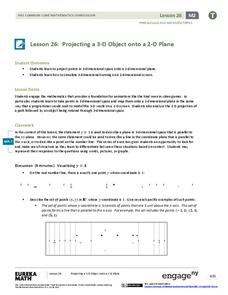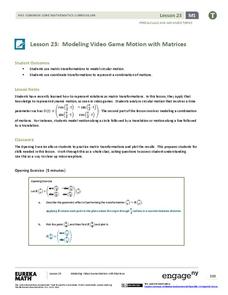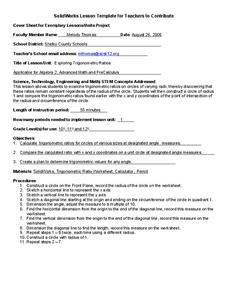EngageNY
Projecting a 3-D Object onto a 2-D Plane
Teach how graphic designers can use mathematics to represent three-dimensional movement on a two-dimensional television surface. Pupils use matrices, vectors, and transformations to model rotational movement. Their exploration involves...
EngageNY
First-Person Computer Games
How do graphic designers project three-dimensional images onto two-dimensional spaces? Scholars connect their learning of matrix transformations to graphic design. They understand how to apply matrix transformations to make...
EngageNY
Modeling Video Game Motion with Matrices 2
The second day of a two-part lesson on motion introduces the class to circular motion. Pupils learn how to incorporate a time parameter into the rotational matrix transformations they already know. The 24th installment in the 32-part...
EngageNY
The Geometric Effect of Some Complex Arithmetic 1
Translating complex numbers is as simple as adding 1, 2, 3. In the ninth lesson in a 32-part series, the class takes a deeper look at the geometric effect of adding and subtracting complex numbers. The resource leads pupils into what it...
EngageNY
When Can We Reverse a Transformation? 3
When working with matrix multiplication, it all comes back around. The 31st portion of the unit is the third lesson on inverse matrices. The resource reviews the concepts of inverses and how to find them from the previous two lessons....
EngageNY
Designing Your Own Game
Your classes become video game designers for a day! They utilize their matrices, vectors, and transformation skills to create and design their own game images. The complex task requires learners to apply multiple concepts to create their...
Alabama Learning Exchange
Binomial Expansion—Shortcut Please
There has got to be a better way; you just have to find it! Given a general binomial to expand with increasing powers, pupils realize that there must be a better way than multiple multiplications. Classmates look for patterns and use...
Alabama Learning Exchange
Logarithms: Undo the Exponential
Rumor has it that an exponential can be undone. After playing a rumor game to model exponential growth, pupils learn about undoing exponential functions. They use the definition of the logarithm to convert exponential equations to...
Alabama Learning Exchange
Building Functions: Reverse to Inverse
Reverse the wrapping to get to the gift. Using the idea of unwrapping a gift, the lesson introduces the concept of inverses. Pupils first determine the order needed to evaluate a function at a point, then use the reverse to find the...
Alabama Learning Exchange
Triangle Area: No Height? Use the Sine
No height? No problem! Learners use their knowledge and a little help from GeoGebra to develop the Law of Sines formula. The Law of Sines helps to determine the height of triangles to calculate the area.
Alabama Learning Exchange
Building Functions: Inverse Functions from Tables and Graphs
Is the inverse a function? Scholars learn how to examine a function to answer this question. Using an online interactive, they examine the properties of inverse functions to compare to the original function.
Alabama Learning Exchange
Unit Circle: Special Angles—Just Know One
It's all about the patterns! Young scholars learn that the unit circle repeats itself in all four quadrants. Using these patterns, they evaluate the sine, cosine, and tangent of special angles.
Alabama Learning Exchange
Swim the Open Sea: Analyzing Duel Vectors
This dual vector lesson has the class watch a video about a person's swim of the English Channel. The class then uses a computer program to analyze dual vectors of wind's effect on a flight path of a plane as compared to the water...
Curated OER
Graphing at all Levels: It's a Beautiful Thing!
Mixing math and art is done in this lesson by applying graphing knowledge to create a unique piece of art. This lesson varies acording to the graphing knowledge of the artist. First, learners identify and review various types of graphing...
Curated OER
Woody Sine
High schoolers explore the concept of sine. In this sine lesson, students create a sine graph from tooth picks. High schoolers create a unit circle with tooth pick length radius. Students then take the tooth picks from the unit circle...
Alabama Learning Exchange
Technology for Displaying Trigonometric Graph Behavior: Sine and Cosine
Young scholars explore the concept of sine and cosine. In this sine and cosine lesson, students work in groups to graph sine and cosine functions. Young scholars examine how coefficients in various parts of each parent function shift...
Alabama Learning Exchange
Ellipse
Students explore the concept of ellipses. In this ellipses lesson, they construct ellipses on their paper and follow directions on a worksheet that allow them to investigate an ellipse in more depth by looking at the major axis, foci, etc.
Curated OER
Line of Best Fit
High schoolers explore the concept of linear regression. In this linear regression lesson, students do a Barbie bungee activity where they collect linear data. High schoolers plot their data using a scatter plot. Students determine a...
Curated OER
Pythagorean Theorem
Learners solve problems using the Pythagorean Theorem. In this geometry lesson, students identify the sides and angles of a right triangle. They find the different trigonometric ratios and solve using sine, cosine and tangent.
Curated OER
Exploring Trigonometric Ratios
Students calculate the different ratios using a right triangle. In this trigonometry lesson, students identify the sine, cosine and tangent of each side. They find the missing angles using the different ratios.
Curated OER
The Quest For Power
Students investigate and apply properties of math. In this algebra and physics lesson, students define important vocabulary words to create a basic understanding of keywords. They perform experiments using concepts of electricity and math.
Curated OER
Unit Circle Triangle
Students find the different ratios of a right triangle. In this geometry lesson plan, students apply the concept of the Pythagorean theorem as they identify the different angles and parts of a Unit Circle. They find the ratios of sine,...






















